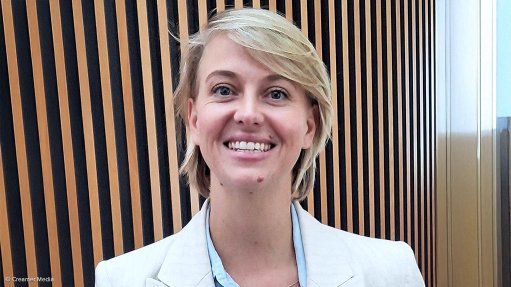Material efficiency can improve energy efficiency
Improved understanding of material efficiency at different stages of the casting process and the associated energy and operating materials required at each of these stages can be used to gather important information needed to promote efficiency improvements at foundries, says local consultancy Environmental and Sustainability Solutions executive director Seakle Godschalk.
He highlighted material effi- ciency, which focuses on the amount of a particular material needed to produce a particular product, at the 2013 South African Metal Casting Conference, in the North West, last month.
These improved efficiencies could be achieved by using a popular method – material flow cost accounting (MFCA) – upon which a new International Organisation for Standardisation standard, ISO 14051 for environmental management, was developed, he explained.
MFCA created a framework for cost reduction in waste and highlighted the environmental and financial effects of material- and energy-use practices at foundries.
Godschalk asserted that MFCA was the appropriate tool to be exploited by the foundry industry, as it focused on raw material use and the role of raw material efficiency in foundry processes.
“During a pilot cleaner-production study of five foundries in 2010, it was found that raw material efficiency is the main driver of energy and operating- materials use in the foundry sector. During the study, raw material was internally recycled to a large extent; however, the large quantity of internal recycling resulted in large amounts of energy and operating materials having to be expended in the process,” he said.
MFCA assisted in analysing the consumption of raw materials, energy, water and operating materials at each stage of the casting process in foundries. It identified the percentage of these inputs that formed part of the final product and any leftover inputs ended up as nonproducts or waste.
MFCA enabled foundry managers to link material efficiency with the efficient use of other inputs; therefore, major sources of inefficiency could be identified, creating a foundation for efficiency improvements.
The application of MFCA in foundry production processes was illustrated at the Metal Casting Conference through the Foundry Material Loss Model (FMLM), which was developed during the 2010 pilot cleaner-production survey and could effectively be used to identify major sources of inefficiency and serve as a basis for cost-benefit analyses.
It was also used to identify the type, extent and location of the raw material and associated losses, the major drivers of these losses and the manipulation of material loss rates to determine impacts of improvement.
In an assessment based only on the financial input data of a foundry, which included raw materials, energy, water and sanitation, as well as sand, the study revealed that a foundry’s raw material efficiency ranged from 15.5% to 69.5%, while monetary losses, owing to raw material inefficiency (excluding labour and equipment) ranged from R6.123-million to R8.456-million.
The losses, owing to raw material inefficiency ranged from 14.1% to 30.8% of input costs and the loss of raw material ranged from 3.0% to 9.8%.
Godschalk said, if the loss of raw material was excluded, the loss of all other inputs ranged from 43.1% to 80.7% and energy comprised about 50% of the total losses.
“This was not a full-blown MFCA assessment, but a specific application of MFCA within a cleaner-production assessment. Information on physical quantities was not sufficiently available; therefore, the FMLM was based on financial information only. Labour and equipment costs were not included; therefore, losses indicated were an underestimation,” he added.
Article Enquiry
Email Article
Save Article
Feedback
To advertise email advertising@creamermedia.co.za or click here
Announcements
What's On
Subscribe to improve your user experience...
Option 1 (equivalent of R125 a month):
Receive a weekly copy of Creamer Media's Engineering News & Mining Weekly magazine
(print copy for those in South Africa and e-magazine for those outside of South Africa)
Receive daily email newsletters
Access to full search results
Access archive of magazine back copies
Access to Projects in Progress
Access to ONE Research Report of your choice in PDF format
Option 2 (equivalent of R375 a month):
All benefits from Option 1
PLUS
Access to Creamer Media's Research Channel Africa for ALL Research Reports, in PDF format, on various industrial and mining sectors
including Electricity; Water; Energy Transition; Hydrogen; Roads, Rail and Ports; Coal; Gold; Platinum; Battery Metals; etc.
Already a subscriber?
Forgotten your password?
Receive weekly copy of Creamer Media's Engineering News & Mining Weekly magazine (print copy for those in South Africa and e-magazine for those outside of South Africa)
➕
Recieve daily email newsletters
➕
Access to full search results
➕
Access archive of magazine back copies
➕
Access to Projects in Progress
➕
Access to ONE Research Report of your choice in PDF format
RESEARCH CHANNEL AFRICA
R4500 (equivalent of R375 a month)
SUBSCRIBEAll benefits from Option 1
➕
Access to Creamer Media's Research Channel Africa for ALL Research Reports on various industrial and mining sectors, in PDF format, including on:
Electricity
➕
Water
➕
Energy Transition
➕
Hydrogen
➕
Roads, Rail and Ports
➕
Coal
➕
Gold
➕
Platinum
➕
Battery Metals
➕
etc.
Receive all benefits from Option 1 or Option 2 delivered to numerous people at your company
➕
Multiple User names and Passwords for simultaneous log-ins
➕
Intranet integration access to all in your organisation

















